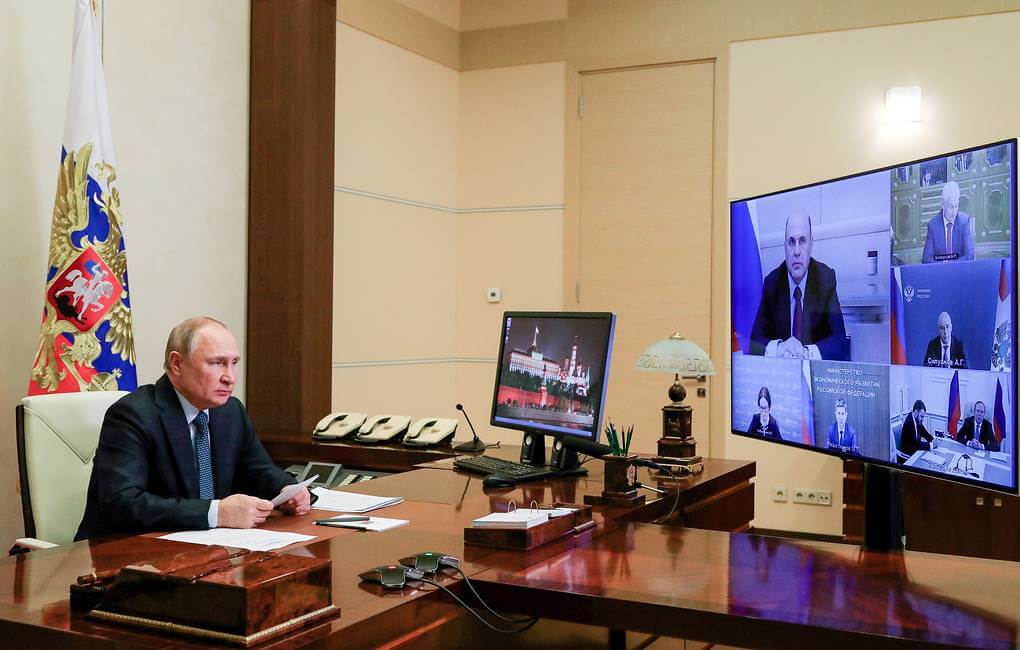On Monday, Russian President Vladimir Putin met top officials from Russia’s Central Bank and the government to discuss the recent economic performance and ways to protect the country from Western sanctions to help support domestic businesses, manufacturers, and industries. He began his speech by commending Russia’s economic resilience against “unprecedented pressure,” noting that the sanctions have backfired.
“The strategy of unleashing an economic blitzkrieg has been ineffective,” Putin asserted. He used the examples of rising inflation, unemployment, and standard of living in the United States (US) and Europe to demonstrate that the West is suffering from the adverse effects of its own sanctions.
"The economic blitzkrieg strategy didn't work."
— Bloomberg Quicktake (@Quicktake) April 18, 2022
Putin says Russia’s economy has withstood unprecedented pressure from international sanctions and the situation is stabilizing https://t.co/a7r43t7IFo pic.twitter.com/lwOmTTsvY2
Moreover, Putin claimed that the Russian economy is already warding off the effects of the sanctions, with the ruble recovering to its pre-war position and consumer demand also stabilising, albeit after a small period of panic. However, he also acknowledged that Russia’s inflation rate is “very high,” with a 9.4% increase in the last six weeks and a 17.5% increase as of April on a year-to-year basis. In this regard, Putin affirmed that the government is planning to adapt social programmes in accordance with the soaring inflation rate.
Additionally, the Russian leader noted that the unemployment rate is “relatively low” but underscored that it needs to be monitored. Regarding foreign trade, Putin admitted that sanctions by “unfriendly countries” have created logistical difficulties in terms of exports, imports, and payments. In this context, he emphasised the need for the “transition of foreign trade to ruble” or the national currencies of countries Russia has good ties with.
Elvira Nabiullina, the highly respected chairwoman of the Russian central bank who tried to resign weeks ago, told Russian Parliament today the economy there is about to get much worse, as sanctions “will now begin to increasingly affect the real sectors of the economy.”
— Amy Siskind 🏳️🌈 (@Amy_Siskind) April 19, 2022
1/
Towards the end of his speech, Putin highlighted that his government also plans to stop the economy from contracting by providing “greater access to loans” for businesses through the state’s budget. Despite a decrease in lending, “the budget definitely should actively support the economy,” said Putin.
Putin’s address was followed by a speech from Central Bank Governor Elvira Nabiullina. Like the President, Nabiullina recognised the logistical difficulties that Russian businesses will face due to the sanctions. “Russian manufacturers will need to search for new partners, logistics, or switch to the production of products of previous generations,” she stated.
Largely absent from press reportage, the Russian ruble has recovered to its pre-conflict levels against the USD. Like it or not, Central Bank of Russia Gov Elvira Nabiullina has shown that she has the right stuff. Contrary to Pres. Biden’s pronouncements, the ruble isn’t rubbish. pic.twitter.com/NjyJTmUQ1S
— Steve Hanke (@steve_hanke) April 15, 2022
Regarding the sanctions, however, Nabiullina did not share Putin’s optimism, as she remarked, “They will begin to increasingly affect the economy,” referring to how their impact had been limited to Russia’s financial markets until now.
VoxEU, a Europe-based policy research institute, estimates that the sanctions “will no doubt generate a deep recession in the Russian economy.” It also predicted that Moscow will continue to rely on its existing export model, which might be “difficult to undermine.”
Meanwhile, Moscow’s Mayor, Sergei Sobyanin, has warned that almost 200,000 people in his city are on the verge of losing their jobs after several foreign companies suspended operations in Russia over the Ukraine war. He highlighted that the government had already passed a $41-million programme to help people who have lost their jobs but said that will only offer support to 58,000 people.

